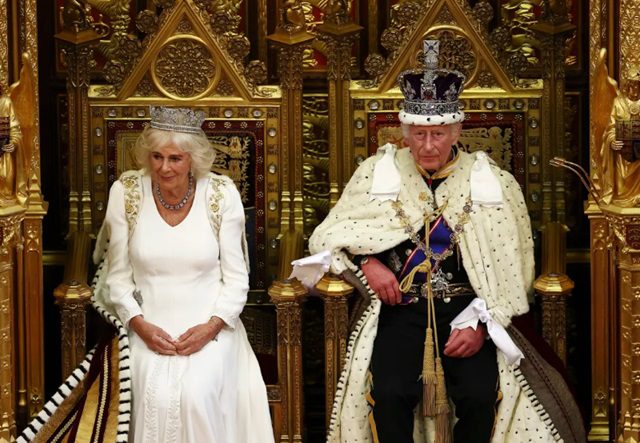BTN News: On Wednesday, King Charles III led the opening of the new parliamentary session. This event marked the first left-wing government in 14 years. Dressed in ceremonial clothes and wearing the state crown, he gave a speech. The speech outlined the legislative plans of Prime Minister Keir Starmer’s government. This event, full of tradition, shows how the UK has changed from an absolute monarchy to a democracy. Today, real power is in the hands of the elected House of Commons.
The Importance and Tradition of the King’s Speech in Parliament
The King’s Speech is an important event. The monarch reads a speech written by the elected government. This speech explains the government’s plans for the next year. This year, Starmer’s administration wrote the speech, and King Charles read it in a joint session of the House of Lords and the House of Commons. This event shows the monarch’s role as head of state and is rich in history.
The Historical Background and Rituals of the Parliament Opening Ceremony
The opening of Parliament is full of historical rituals. The day starts at 9:30 AM when the Royal Guard searches the Parliament’s cellars for explosives. This tradition dates back to the Gunpowder Plot in 1605. The search reminds us of the failed attempt by Guy Fawkes and other rebels to kill King James I by blowing up the Parliament.
Later in the morning, the Household Cavalry leads a parade from Buckingham Palace to Parliament. The king travels in a golden carriage. Another carriage carries the Imperial State Crown, a velvet cap, and the State Sword. This parade shows the continuity and stability of the monarchy.
A unique tradition is that a member of Parliament stays at Buckingham Palace as a symbolic hostage. This tradition ensures the monarch’s safe return. It dates back to King Charles I, who tried to arrest legislators in 1642. He wanted to rule without Parliament’s consent. This led to his trial for treason and his execution. Since then, no monarch has entered the House of Commons. The ceremony is held in the House of Lords instead.
The Black Rod, a security official, is sent from the Lords to call the Commons. MPs slam the door in the Black Rod’s face to show their independence. The Black Rod then knocks three times with a staff to be let in. This emphasizes the elected chamber’s authority. Once inside, MPs gather in the Lords’ chamber, showing rare unity among the often divided group.
The King’s Role and Presentation During the Ceremony
King Charles gives his speech from a golden throne. He wears the State Robe and the Imperial State Crown. This year was his third speech, and his second as king. In 2022, Queen Elizabeth II gave the task to Charles. This showed a transition of responsibilities. At that time, the queen’s throne was removed. Her crown was placed on a cushion, showing her presence even in her absence. Charles, in a naval uniform with gold, stepped in for his mother.
Now as king, Charles leads the ceremony in full regalia. He must read the government’s script and stay neutral. His expression does not show his opinions on the policies. This neutrality is important because the speech represents the government’s agenda, not the monarch’s views.
The Ceremony’s Importance and Impact on British Government
The elaborate ceremony reminds everyone of the UK’s long history and constitutional principles. It highlights the change to a constitutional monarchy where real power is with the people. Historian George Gross from King’s College London says these traditions show the shift of power to the people through the government.
Anthropologist Emma Crewe from SOAS University of London notes that the ceremony has something for everyone in the British government. This includes the Lords, the MPs, and the Crown. She says these traditions tell powerful stories, reminding us to protect and engage with the nation’s political institutions.
The opening of Parliament is more than a ceremonial event. It shows the UK’s democratic values and historical legacy. It highlights the balance of power between the monarchy and the elected government. As King Charles III continues his role, these traditions remind us of the UK’s journey toward constitutional democracy.


